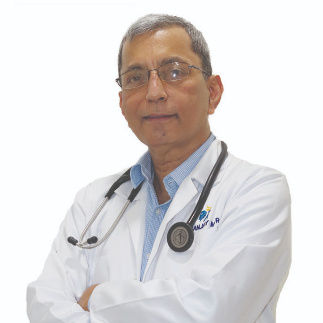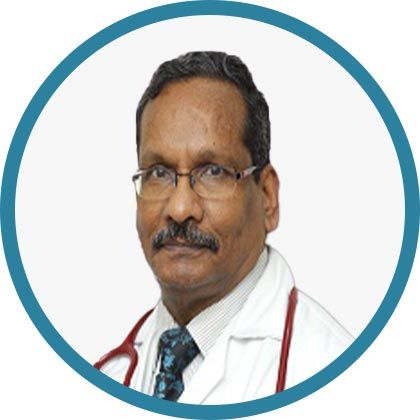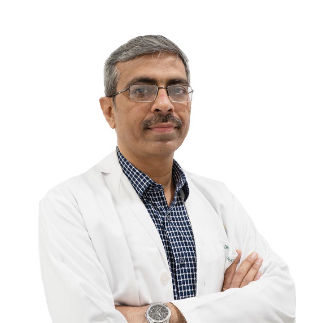Welcome User
Relevance
Best Online Doctors for Nephrology (59 doctors)
Book appointment for a trusted Nephrologists in Secunderabad. Check doctor fees, available slots & locations. Apollo 24|7 features some of the top Nephrologists in Secunderabad who have experience in treating conditions such as Kidney Failure, Acute Renal Failure, Dialysis and more. You can book online consultations & physical doctor appointments via Apollo 24|7. Compare Nephrologists fees, experience and more, find a specialist doctor near you. Apollo hospitals has a renowned Nephrology department in Secunderabad.
No doctors available for physical visits. Showing doctors for online consultations only.

Dr. Jayant Kumar Hota
Nephrologist
20 Years • MBBS, MD, DM (Nephro)
Delhi
Apollo Hospitals Indraprastha, Delhi
(75+ Patients)

Dr. Prakash Pandharinath Ugale
Nephrologist
8 Years • MBBS MD DNB (Nephro)
Nashik
Apollo Hospitals Nashik, Nashik

Dr. Mohan Patel
Nephrologist
7 Years • MBBS MD (Med) DM (Nephro) FASN, FISN, ANIO
Nashik
Apollo Hospitals Nashik, Nashik
(25+ Patients)

Dr. Arun Prasath P
Nephrologist
8 Years • MD.,DM., DNB., (Nephro)
Madurai
Apollo Speciality Hospitals KK Nagar, Madurai
(50+ Patients)

Dr. Saravanan R
Nephrologist
5 Years • MBBS., MD., ( General Medicine) DNB Nephrology
Madurai
Apollo Speciality Hospitals KK Nagar, Madurai
(50+ Patients)

Dr. Sanjay Maitra
Nephrologist
24 Years • MBBS, MD (Int. Med.), DM (Nephro)
Hyderabad
Apollo Hospitals Jubilee Hills, Hyderabad
(125+ Patients)

Dr. Jony Agarwal
Nephrologist
4 Years • MBBS, MD (Internal Medicine), DM (Nephrology)
Lucknow
Apollomedics Super Speciality Hospital, Lucknow
(50+ Patients)

Dr. Subba Rao B
Nephrologist
20 Years • MD, DNB
Chennai
Apollo Hospitals Greams Road, Chennai
(300+ Patients)

Dr. Gaurav Sagar
Nephrologist
13 Years • MBBS, MD, DNB
Delhi
Apollo Hospitals Indraprastha, Delhi
(50+ Patients)

Dr Vinay Kumar A V
Nephrologist
8 Years • MBBS, MD - General Medicine, DM - Nephrology
Bilaspur
Apollo Hospitals Seepat Road, Bilaspur
Top Kidney Specialist in Secunderabad: Avail Expert Care for Your Kidney Health
Introduction
Find a top kidney specialist in Secunderabad who offers patient-centred nephrology services for conditions such as acute
kidney injury, chronic kidney disease, hypertension and urinary disorders. Kidney Specialists provide comprehensive care that includes diagnostic evaluation, medical therapy, dialysis planning and transplant coordination, supported by advanced laboratory and imaging facilities. Whether you require routine monitoring, urgent assessment for abnormal
kidney test results or long-term renal management, specialists ensure timely and evidence-based treatment. With Apollo
24|7, you can easily locate a verified kidney doctor in Secunderabad, upload previous medical reports and schedule
teleconsultations or in-clinic appointments. This seamless system helps you receive coordinated care without delay,
ensuring your kidney health is monitored and managed effectively.
When Should You Visit a Kidney Specialist in Secunderabad for a Proper Renal Health Assessment?
Consult a top kidney specialist in Secunderabad if you have symptoms including persistent swelling, unexplained
tiredness, foamy or bloody urine, frequent urination at night, or poorly controlled blood pressure. People with diabetes,
cardiovascular disease or a family history of kidney failure should consider earlier specialist review. Early nephrology
input can identify reversible causes, reduce progression of kidney disease and help to plan interventions such as
medication changes, dietary counselling and dialysis access when required.
Recommended Frequency for Kidney Checkups with Specialists in Secunderabad
Checkup frequency is risk-based: It is annual for low-risk adults, every 6 to 12 months for those with diabetes or
hypertension, and more frequent reviews for patients with declining eGFR, significant proteinuria or recent AKI. Your
kidney specialist in Secunderabad will set personalised follow‑up intervals to monitor trends and adjust treatment.
When to Consult a Kidney Doctor for High Creatinine or Swelling Issues?
High creatinine or new oedema suggests reduced kidney clearance or protein loss. A nephrology specialist will order
confirmatory blood and urine tests, imaging tests, and start interventions to correct fluid balance and address underlying
causes.
Warning Signs That Require Immediate Attention from a Kidney Specialist
Urgent signs include a sudden drop in urine output, severe flank pain, visible blood in urine, breathlessness due to fluid
overload or dangerously high blood pressure levels. These signs require immediate specialist intervention.
Managing Blood Pressure and Urine Problems with a Kidney doctor Guidance
Nephrologists individualise blood pressure levels, choose kidney‑protective interventions and investigate abnormal urine
level findings. They coordinate with other specialists to reduce renal risk and manage fluid and electrolyte disturbances.
Essential Things to Know Before Consulting a Kidney Specialist in Secunderabad
Bring recent lab results, urine reports, imaging and a full medication list. Note any recent infections, contrast studies or
use of NSAIDs. Expect a focused exam, blood and urine tests and possible imaging; some patients may require a renal
ultrasound or a 24‑hour urine collection. Uploading reports to Apollo 24|7 before the visit speeds triage and helps the
nephrology specialist in Secunderabad prepare.
How Do Kidney Specialists in Secunderabad Diagnose and Evaluate Renal Disorders?
Diagnosis involves a combination of clinical assessment, laboratory tests, and imaging studies. Routine evaluation
includes serum creatinine/eGFR, electrolytes, urine dipstick and protein quantification, renal ultrasound and blood
pressure measurement. When indicated, specialists order autoimmune test panels, complement levels, CT imaging or
kidney biopsy to define glomerular disease. These tests enable a kidney specialist doctor in Secunderabad to determine
disease stage and tailor treatment.
Common Diagnostic Tests and Procedures Performed by Kidney Specialists
Common tests include serum creatinine, eGFR, electrolytes, urine microscopy, urine protein: creatinine ratio, renal
ultrasound and blood pressure monitoring. Additional investigations may include serology, 24‑hour urine collections
and imaging for obstruction.
How Do Kidney Specialists Detect Early Kidney Damage or Urinary Tract Issues?
Early damage is detected by microalbuminuria, rising creatinine level or persistent haematuria. Specialists utilise urine
protein ratios, microalbumin tests and ultrasound to identify early disease presence and intervene to slow progression.
Preparation Tips Before Meeting Your Kidney Specialist?
Bring prior lab reports, medication list and imaging. Fast if requested and note recent fluid intake or infections. Prepare
a concise symptom history for the kidney specialist.
Common Tests You Can Expect During Your First Nephrology Consultation?
Expect blood tests for creatinine, electrolytes, urine dipstick, protein quantification and blood pressure measurement;
ultrasound may be arranged if structural disease is suspected.
What Treatment Options Do Kidney Specialists in Secunderabad Offer for Chronic and Acute Conditions?
Treatment includes medication optimisation, dietary counselling, fluid management, immunosuppression for glomerular
disease, and dialysis planning. Acute kidney injury may require hospitalisation, fluid and electrolyte correction and
temporary dialysis. Chronic care focuses on slowing progression, managing anaemia and bone disease, and preparing
for renal replacement therapy when necessary. A kidney specialist in Secunderabad coordinates multidisciplinary care,
including dietitians and transplant teams.
Effective Treatment and Management Approaches by a Kidney doctor in Secunderabad
Nephrologists emphasise blood pressure and glycaemic control, RAAS blockade for proteinuria, lipid management and
lifestyle measures. They personalise immunosuppression for glomerulonephritis and plan timely dialysis or transplant
referral to maintain quality of life.
Which Symptoms Indicate You Should Visit a Kidney Specialist in Secunderabad?
See a kidney specialist in Secunderabad for persistent swelling, foamy urine, blood in urine, frequent nocturia,
uncontrolled hypertension, recurrent UTIs or sudden changes in kidney tests. Early specialist care preserves kidney
function and reduces complications.
What Treatments and Procedures are Available with Kidney Specialists in Secunderabad?
Services include the management of CKD and AKI, dialysis (hemodialysis, peritoneal dialysis), kidney biopsy, stone
prevention, removal coordination, vascular access creation, immunosuppressive therapy and transplant referral. Clinics
also manage anaemia, bone mineral disorders and provide dietary counselling.
What Are The Available Non-Surgical & Preventive Measures by Kidney Specialists?
Non‑surgical care includes medication review, dietary modification, hydration and stone prevention strategies, blood
pressure and diabetes control, and regular monitoring to prevent progression.
Why Choose Apollo 24|7 for Kidney and Nephrology Care in Secunderabad?
Apollo 24|7 lists verified kidney specialists in Secunderabad, supports secure report upload and offers teleconsultation and in‑person booking. Use the platform to compare credentials, read reviews and coordinate referrals for any type of
service, including dialysis or transplant.
Easy Online Booking and Follow-Up Consultations with Kidney Specialists
Book appointments, upload reports and schedule follow‑ups with a kidney specialist in Secunderabad via Apollo 24|7
for seamless ongoing care.
FAQs
Can kidney specialists help manage blood pressure and kidney stone problems?
Yes. They optimise blood pressure and provide metabolic evaluation and prevention plans for stones.
Are kidney specialists trained to treat chronic kidney disease and dialysis patients?
Yes. Nephrologists manage CKD progression, dialysis and transplant evaluation.
What are the risks of ignoring early signs of kidney pain or fatigue?
Delays can lead to advanced CKD and fewer treatment options; early review improves outcomes.
How much does it cost to consult a top kidney specialist in Secunderabad?
Fees vary; Apollo 24|7 lists consultation charges so you can compare specialists.
Do kidney specialists in Secunderabad treat urinary tract infections and hypertension?
Yes. They manage recurrent UTIs and hypertension affecting kidney health.
What care routine should I follow after a visit to a kidney doctor near me?
Follow medication advice, attend tests and report new swelling or reduced urine output.
Can a kidney doctor in Secunderabad help prevent kidney stone recurrence?
Yes. Specialists provide metabolic evaluation and preventive strategies.
Can a nephrology specialist detect kidney problems caused by diabetes?
Yes. They screen with urine albumin and eGFR monitoring and advise on targets.
Is a follow-up visit needed after dialysis or a kidney function test?
Yes. Follow‑up ensures adequacy and medication adjustments.
Do kidney doctors in Secunderabad perform minor kidney procedures or biopsies?
Yes. Many perform biopsies and coordinate vascular access creation.